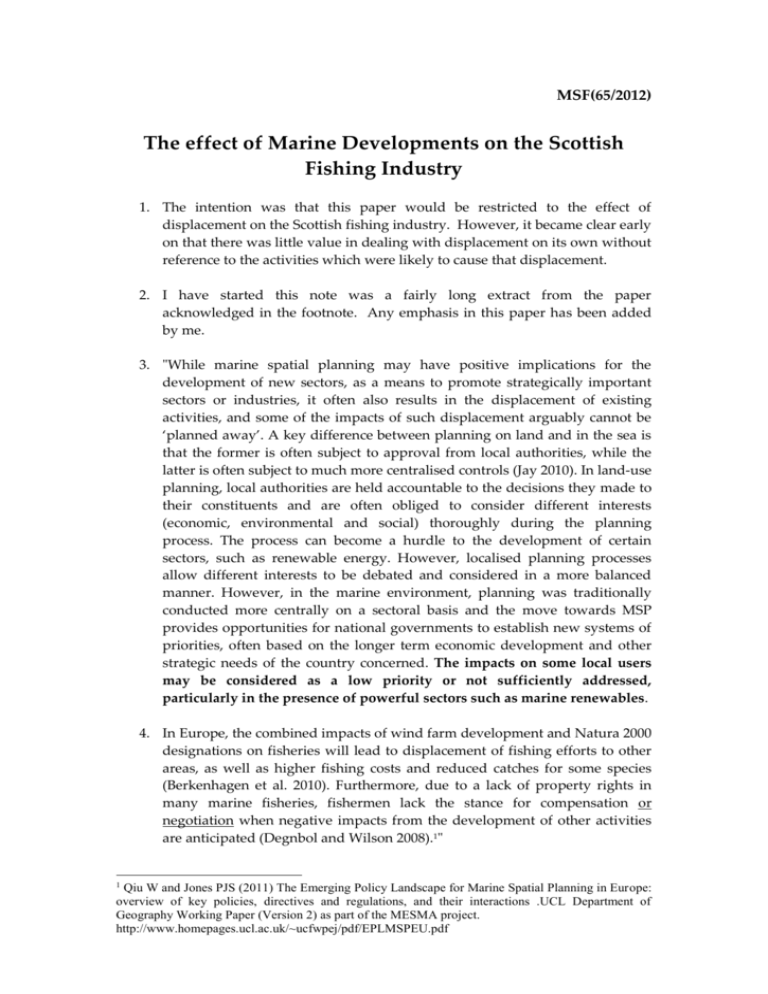While marine spatial planning may have positive implications for the
advertisement

MSF(65/2012) The effect of Marine Developments on the Scottish Fishing Industry 1. The intention was that this paper would be restricted to the effect of displacement on the Scottish fishing industry. However, it became clear early on that there was little value in dealing with displacement on its own without reference to the activities which were likely to cause that displacement. 2. I have started this note was a fairly long extract from the paper acknowledged in the footnote. Any emphasis in this paper has been added by me. 3. "While marine spatial planning may have positive implications for the development of new sectors, as a means to promote strategically important sectors or industries, it often also results in the displacement of existing activities, and some of the impacts of such displacement arguably cannot be ‘planned away’. A key difference between planning on land and in the sea is that the former is often subject to approval from local authorities, while the latter is often subject to much more centralised controls (Jay 2010). In land-use planning, local authorities are held accountable to the decisions they made to their constituents and are often obliged to consider different interests (economic, environmental and social) thoroughly during the planning process. The process can become a hurdle to the development of certain sectors, such as renewable energy. However, localised planning processes allow different interests to be debated and considered in a more balanced manner. However, in the marine environment, planning was traditionally conducted more centrally on a sectoral basis and the move towards MSP provides opportunities for national governments to establish new systems of priorities, often based on the longer term economic development and other strategic needs of the country concerned. The impacts on some local users may be considered as a low priority or not sufficiently addressed, particularly in the presence of powerful sectors such as marine renewables. 4. In Europe, the combined impacts of wind farm development and Natura 2000 designations on fisheries will lead to displacement of fishing efforts to other areas, as well as higher fishing costs and reduced catches for some species (Berkenhagen et al. 2010). Furthermore, due to a lack of property rights in many marine fisheries, fishermen lack the stance for compensation or negotiation when negative impacts from the development of other activities are anticipated (Degnbol and Wilson 2008).1" 1 Qiu W and Jones PJS (2011) The Emerging Policy Landscape for Marine Spatial Planning in Europe: overview of key policies, directives and regulations, and their interactions .UCL Department of Geography Working Paper (Version 2) as part of the MESMA project. http://www.homepages.ucl.ac.uk/~ucfwpej/pdf/EPLMSPEU.pdf 2 5. In spite of the avowed intention of the Scottish Government to support the Scottish fishing industry not only for its contribution to the economy but perhaps, more importantly, its contribution to Scottish rural life, there appears to be little enthusiasm for protecting industry against the effects of offshore developments. 6. There could be no complaint if, legislatively, there was allowed a straightforward defence of fishing against activities which would restrict or eliminate current fishing activity or fishing activity which might be reasonably expected in the relevant area in the future. However if such a defence exists the Scottish Government seems reluctant to admit industry to its source. One suggestion has been that section 27 (1) (iii) of the Marine (Scotland) Act 2010 provides such a defence. However the subsection reads, no more than, that Ministers must have regard to the need to prevent interference with legitimate uses of the sea. There has been no sign in applications which have undergone the process that that regard has done anything to protect the interests of fishing. If clarification can be obtained as to the actual effect of this requirement, it may help to illuminate and reassure. 7. It has been indicated that the proposed Marine Plan will give all the protection that is necessary. This is difficult to understand on two fairly formidable grounds. The first is that presumption has been given in favour of the installation of Offshore Renewables, both by strong policy drivers and a presumptive marine plan. These ambitions have been further reinforced by the commercial imperative of the Crown Estate Commissioners who are insistent that a licence will be granted where consent is given. The second is the legislative presumption given in favour of the establishment of a network of Marine Protected Areas. That presumption carries with it the right to prevent or eliminate fishing activity within those areas. It should be noted that the right to propose establishment of MPAs is not restricted to Government alone but is available to 3rd parties whose intentions, in certain cases towards fishing activity are not exactly amicable 8. One might have expected that the licensing and consenting regime would have taken into account the great increase in the volume and type of marine activity which has arisen since the last of the Acts of Parliament now adapted to be the basis of the regime. That Act was passed in 1975 and an even earlier Act of 1949 forms the second pillar of the licensing process. There is nothing which directly allows a competing activity, to that for which consent is being applied, to obtain a rejection of the application on the basis of the value of the activity being displaced. This is so very different from the rules which govern terrestrial planning. 9. From time to time the benefits of the experience of terrestrial planning is prayed in aid of the proposed marine planning process. It will be noted that the article above contains a strong argument against comparison. The writer would not exactly support the present terrestrial planning procedures, but he would do so if planning rules were applied quasi-judicially as they are 3 supposed to be. He does not see however that marine planning rules can be applied other than politically. However the essential difference between terrestrial and maritime planning decisions is that those who conduct and activities at sea have, no real right of ownership on which to defend the conduct of their activity and no basis for compensation, if displaced. 10. Given the circumstances it behoves Government to ensure that the protection of existing activity has a presumption in favour of proposed activity. If it refuses to or is unable to do so then it must ensure that displacement is effectively managed and , where necessary, supported financially. 11. As an aside, it should be noted that even the most basic protections are not being brought into practice. Specifically reference is made to the ability to introduce pre-application consultation regulations for licensing and consenting. Enquiries as to progress with this work, first made last summer, have resulted in no more than delaying responses. The first request for a meeting with Scottish Government in relation to possible defences for fishing activity against other maritime developments first made on 24 June 2011 has yet to be responded to substantively. It is difficult to avoid the conclusion, therefore, that the SFF concerns are well founded. If that is the case then the problem should be faced now rather than being allowed to fester. 12. The concern of the SFF is, in the first place, to establish that there will be no presumption in favour of any particular maritime activity. This proposal does not diminish the policy priorities of the Scottish Government in relation to offshore renewables and MPA establishment. If there were to be an equality of treatment it is likely that the co-operation of the fishing industry in relation to those priorities might be more easily obtained. 13. Reference has already been made to displacement. Early discussions in relation to displacement, not just in terms of the statutory duty on Ministers, but across the range of proposed activities are necessary. It is noted that Defra has already started work on this for developments in waters south of the border. Close co-operation in that study is highly recommended. 14. On the matter of funding displacement it is suggested that the equivalent of the community development fund operated for onshore developments should be, prior to any consideration of terrestrial habitats, committed to a displacement fund for the fishing industry. At the last meeting of MSF the representative of Scottish Renewables expressed a very reasonable doubt that there was any justification for such payments particularly to "over the horizon" communities. The SFF proposes strongly that the alternative has a very reasonable justification. 15. The SFF has always been of the view that most disputes or conflicts between maritime activities and developments can be settled in a rational way. Notwithstanding the plethora of proposed new activities and protections, the sea remains generous in the space which it affords for its exploitation. 4 However the attempt of Government to over-regulate the possibility of negotiated settlement is not seen as helpful. 16. To be more helpful, and in summary, the following would be a beginning: – Confirmation that new and untried industries should not have a presumption against well-established and essential industries such as fishing. It is a given that the protection of the marine environment required by statute, against potentially damaging activity, is a statutory requirement. That Government should encourage early negotiation between competing industries to resolve conflicts. In that case it is essential that appropriate preapplication consultation is introduced by regulation as soon as possible. The differences in approaches by developers to the fishing industry have to be rationalised and this can be done through the Scottish offshore renewables tripartite meeting. Developers must be encouraged to enter into co-operation agreements with fishermen's associations. These have worked well in the past and encourage responsible seamanship during the course of construction, subsequent management and during periods of maintenance and replacement. The Associations involved are not rich bodies so payments to them will assist in providing responsible and focused attention to the detail of the developers' requirements. The SFF would expect government to impress upon developers the value that they will receive from entering into such agreements. The Crown Estate must exercise its duties so as to ensure that the public rights of fishing and navigation are appropriately protected. The Government should confirm the agreement obtained from the previous administration that 'the act of fishing' is a concomitant of the expression 'navigation' referred to in section 30 (3) of the Marine (Scotland) Act 2010 The Government should explain clearly, in a policy statement the extent of Ministers' duty to prevent interference with legitimate uses of the sea. The importance of the assessment and funding of displacement has already been referred to. PLMS 31.01.12





